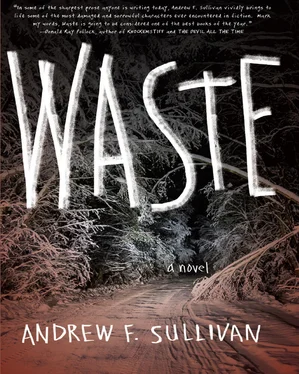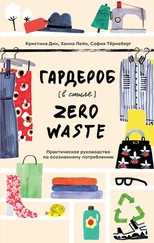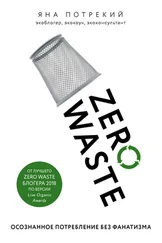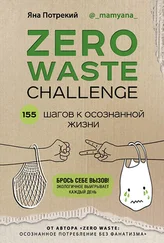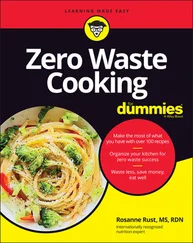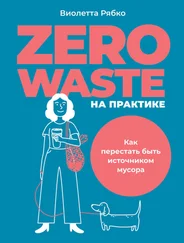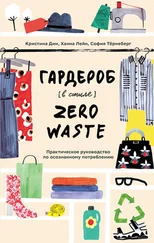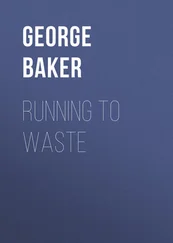“That’s a lot of blood. It looks like a lot, I know, son. But just imagine when you spill a glass of milk. Ever watch how far the puddle spreads? It’s like that. You’ll survive this one.”
Gail laughed at her two boys hiding under the table, eating chunks of sponges they had discovered underneath the sink. She laughed at their giant tufts of hair and their small thumbs and the fact that they never learned to say thank you. She laughed at her parents who moved up to Elliott Lake and didn’t talk to anyone under the age of forty. Gail just kept laughing, laughing at her sister whose husband had been caught stealing snowmobiles behind the old marina last summer. He tried to drive them away on the pavement but got nowhere. Gail laughed at her own husband and his fading eyesight, the way he tried to kiss her cheek and collided with her nose.
Gail couldn’t feel a thing, and it was wonderful. The clot pushed harder, but it could not fit through the tight passage in her brain. Other cells shoved it forward, pleading to circulate. The heart continued to pump them higher and higher into her brain, but there was no place to go. As more pressure built, her laughter descended again. Each cell like a bubble rushing toward the surface of her glass allowed Gail to forget the dread she had attached to those two little boys. She forgot about the lesions in her bladder and the purple marks lining her hips like bad tattoos. Without the pain, she could forgive them all. It would be so easy, but she didn’t have the time.
Eventually the clot in her brain had to travel somewhere. Lorraine would later describe how her sister’s eyes fluttered and then how her body tipped over the quilt, spilling cranberry ginger ale across the carpet. Like she’d been shot in the head, but there wasn’t any blood. The boys wouldn’t let go of her after that. Not even when the cops showed; they had to pry each finger off.
Thomas and Allan Vine grew up clutching what remained of their mother just as tightly. They learned to quilt during a rehabilitation blitz at a juvenile detention facility outside of Milton while serving sentences for aggravated assault and robbery. Tommy was sixteen and Allan was only ten months behind him. They only received two weeks of therapeutic quilt instruction before Thomas stole a batch of needles and both brothers were returned to solitary.
“Tom, I don’t need a wider set of pliers. I need like a cloth or something. Astor sends us out here and I’m the one with a dirty shirt. You think he’s going to pay for the dry cleaning? You think that fucker will even say thank you?”
After their mother died and Osprey moved out of town, Austin Vine had taught them how to hotwire cars with bits of tin foil and knitting needles. He even supplied them with his toolbox and the old.45 he won after a parking lot fight in Winnipeg. Austin’s own prison sentence took him to the Millhaven Correctional Facility for twenty-five years after the bank guard didn’t get up fast enough one day to unlock the safe. The manager was also too slow. As was the receptionist who kept looking at him after the third bullet had passed through her chest and into the drywall. Her lips still moved, but it was like a chicken after the hatchet came down — a sad, headless chicken. That’s what Austin told himself when her ghost returned to chirp an automated greeting into his ear like a mosquito while he rolled around on the cot in his six-by-nine cell. She wasn’t saying anything — it was just muscle memory reciting words without meaning. Austin eventually tried to make friends with the voice, but it couldn’t carry a conversation.
Austin still wrote letters to his sons, those sons everyone else thought were twins. He told them not to ask questions. The less they knew, the less they could reveal. Tommy and Al didn’t spend their cash. They bought all their cars used and lived in the motels below Larkhill. Heeding the wise chicken scratch of their father, the Brothers Vine never stepped forward to fill the void after each round of arrests cleared up the south end of Larkhill for a few months.
They had survived the biker purge after two decades of involvement in Larkhill and positioned themselves in the marinas and the pawnshops as distributors. Al and Tommy routinely rerouted cargo from the shipping docks into trucks for men who never used the same name twice. They paid for everything in cash and spent their weekends in the woods. They’d grown beards in solidarity with their father and still kept his toolbox in their bedroom. The cordless drills were new editions to his set.
“Hey, buddy. You understand us? Hello? You remember our faces, I hope. You got a nice mouth now. A good reminder next time you decide to pull a hit-and-run. You really think a lion just wanders out into the road? This ain’t Narnia. Now for the real part…we still got batteries?”
Gail Vine was a vesper now that they only caught in tiny bursts of light, when their brains were deep within the REM sleep cycle. In this state, her two sons could only remember the way Gail checked her makeup, how she tugged too hard when combing their hair, and the cold pillow she occasionally pressed against their faces when she thought they were asleep.
For Tommy and Al, these were good memories. Much better than the solitary confinement in Milton and the hallucinations they found creeping up through the pipes and out of the toilet bowl. All the children they heard in those sterile halls had thick, wet voices. It was the solitary that had bent them both. They each spent three years flooding their cells and setting fire to shredded sheets with light bulb filaments. Almost the full extent of their juvenile offender sentences were spent alone and together in that isolation. Al and Tommy relied on each other to remember they were real after years of isolation in their own private concrete cells.
“I wanna say this won’t hurt, but we’ve always tried to be honest…”
Everything else drifted on the periphery. Illusions of people moaning in the woods and human apparitions that floated like squiggly lines across the surface of each brother’s eyes. You could never look at those lines directly — they always fled to the corners when you paid too much attention. It made it easy to snap a finger off or disembowel another Bandido out of Winnipeg. The dirt washed out of your clothes and no one ever asked about the smell. Eventually it all faded and the only evidence remaining was the cash in your pocket and the figment of some fatty tissue clinging to the dull bit of your drill. And the drill bits were always dull.
“Almost done, you just gotta hold still. Al, you wanna grab his feet for me?”
Sometimes when they tried to sleep, the brothers saw those dead faces pushing through the stuccoed ceiling to stare down at them. Flooded toilets kept flushing in their dreams, but their solitary cells never let them drown in all that waste. Whenever the ceiling spoke, the white masks would tell Al it was not his fault he grew so big inside his mother’s belly. Broken lips and distended eye sockets of dead associates told him about his girth and weight after the nurse had plopped him on the scale. Ten pounds and ten ounces. Just like his brother. It wasn’t their fault, the ceiling said. Genetics.
“You wanna wash up here or wait until we get back to the motel?”
The body on the basement floor jerked and spasmed. Red bubbles rose and fell from the leaking hole inside its face. Teeth lay around it in a small circle like thrown stones from an ancient, complex ritual. This was a message they were told to send, spelled out in jagged holes and dripping pus. The lion was still dead. No one could bring it back. Astor still would not forgive them fully. The washer and dryer were spattered with blood; there were no words inside its patterns. The Brothers Vine slammed their toolkit shut and looked at one another. They had left this one alive, according to Astor’s instructions. They checked to see if it could breathe, small lungs heaving beside the empty lint trap. Tom kicked the body.
Читать дальше
